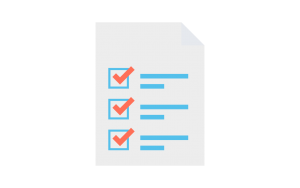Within the Renouval project, content development is ongoing across all partners. As INQS is developing content around Competence Unit 1 – “ICT applied to the craft sector”, we thought that we would share some of the developed content which is aimed at supporting handicraft teachers and trainers around the learning outcome “The learner should be able to develop an awareness of the potential use of a variety of online tools and approaches for communication, collaboration, networking and promotion.”:
Online questionnaires are, quite simply, questionnaires that are conducted online rather than via the more traditional paper-based approach and which can be accessed by respondents via a weblink. Respondents answer the questionnaires online and the data is gathered into a database of sorts by the online questionnaire tool.
The primary advantage of online questionnaires is that they can be widely and easily distributed amongst a large number of people. This can facilitate a move away from the requirement to fill in paper-based questionnaires, which can be time consuming to gather on a one-to-one basis. Most online questionnaire tools also typically automatically perform basic analysis on the quantitative data gathered and generally allow you to export all results to a digital format (e.g. an excel spreadsheet). This avoids considerable additional effort typically required in analysing data from face-to-face or paper-based questionnaires. From the point of view of the individual answering the online questionnaire, the feeling of having a voice (by giving feedback) can be a motivating experience and the possibility to easily access an online questionnaire at home, or in transit on their laptop or mobile device can be very helpful.
A recommended tool for the development of online questionnaires is Google Forms. Google forms is free to use – requiring only a google account – and provides the ability to create a questionnaire featuring a wide range of questions, the ability to edit the look and feel of the questionnaire, initial basic analysis of responses and the ability to download or display the results in a spreadsheet.
Some examples of the different ways in which you can use online questionnaires for gathering feedback from apprentices can include:
- Gauging the apprentice’s overall satisfaction with the apprenticeship
learning process and the teaching involved.- Allowing apprentices to indicate what elements of the training they are
unfamiliar with or what elements they need revisited.- Allowing apprentices to indicate pre-existing attitudes, knowledge,
biases, etc. at the beginning of a learning experience and then comparing
these to same at the end of a module- Etc.
For more on the Renouval project (including the curriculum developed on intergenerational learning and validation of skills in craft sectors), please see https://www.renouval-project.eu
